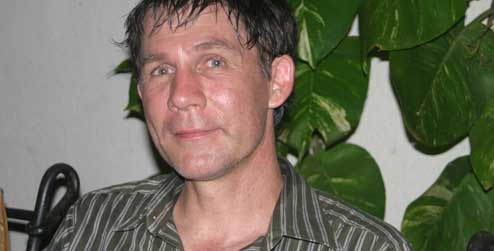
Franck is from Belgium and is currently working as an Agro-ecology Expert with the Association of Women Producers (ASOMUPRO) – “Las Gaviotas” in Estelí, Nicaragua.
How do you describe yourself?
I am a utopian, and eternally dissatisfied with what I do. There is always a way to do things better.
You have been a development worker for Progressio in Nicaragua before, why have you decided to apply again?
Well, in reality the opportunity to work with women in agro-ecology attracted me in the sense of achieving a greater impact in the work that I do. This is because women are responsible for the family’s food security. They value healthy food highly as they often have the responsibility of looking after their daughters and sons’ health. And they are the ones who participate most actively within the local markets, which make them closer to the concept of food sovereignty.
What is your first memory when you came to Nicaragua?
I am from Belgium but I spent my childhood in Congo, where poverty and underdevelopment reign. Being in the second poorest country in Latin America, I thought I would see similar situations to those I had seen in Africa, but to my surprise it was altogether different. Here, bad or good, public services work, there is rubbish collection once or twice a week, small farmers’ lands have barbed wire fences and travelling by bus is relatively comfortable. Nonetheless, it continues to be the Third World, with children begging at the traffic lights; and in the communities, rural poverty is carved in the faces of the small farmers.
What has been the most exciting moment so far?
When in a forum, I heard small-scale farmers’ leaders expressing their position about the sector’s economic and political agenda. In front of the key decision-makers who have marginalised and excluded them for centuries, it triggered a great debate of ideas, which confirms that the small-scale farmer/peasant’s movement continues to resist!
What is the biggest lesson learnt so far?
I work in agro-ecology in a country that pushed a huge radical agrarian reform that favoured thousands of small-scale farmers. Sadly, however, the Sandinista Revolution was incapable of changing a production model based on the monoculture for exports of large land areas, inherited from the Somoza dynasty. Having ended the generous agro-chemical subsidies and eliminated the price guarantee system, small peasants were losing their land to the point that 25 years later there is little of that agrarian reform left. I feel that Nicaragua has lost the great opportunity to push for an agro-ecological revolution parallel to the provision of land.
Which celebrity, dead or alive, would you like to have a dinner with?
With Rene Dumont, a Frenchman concerned with the Third World. In the 70s, he had the vision that the developmentalist and consumerist models would take us to the planet’s destruction. 40 years after his book “Utopia or Death”, it is being confirmed that climate change is irreversible.
Where do you see yourself in five years time?
I think that I will be still in Nicaragua because I identify myself with the rural world and feel that I can contribute to influence, in my own way, the path to be followed by this country, hoping that the rural world plays its part in achieving wellbeing for all.
In your opinion, what will be the big development theme in 2010?
Without doubt, the environmental issues within the context of climate change. It is sad to say, but I don’t see another solution: either nations opt for human and sustainable development models or we are heading towards a clash with those that insist in following the dominant neo-liberal model, with the dramatic economic, social, environmental and cultural consequences that we know this would bring about.
What is your favourite phrase?
“Poor countries are poor because they are rich” by Eduardo Galeano. Nicaragua is a rich country in natural resources, impressive biodiversity, incredible sources of water, fertile land of volcanic origin, beautiful cloud forest, but others are the ones who are benefiting from this wealth. Until when?
What advice would you give to someone who wants to become a development worker?
That the best learning, which we might have during the various processes of change that we promote, happens when we are with the target group. So we should make the effort to be more in contact with people rather than with the computer.


